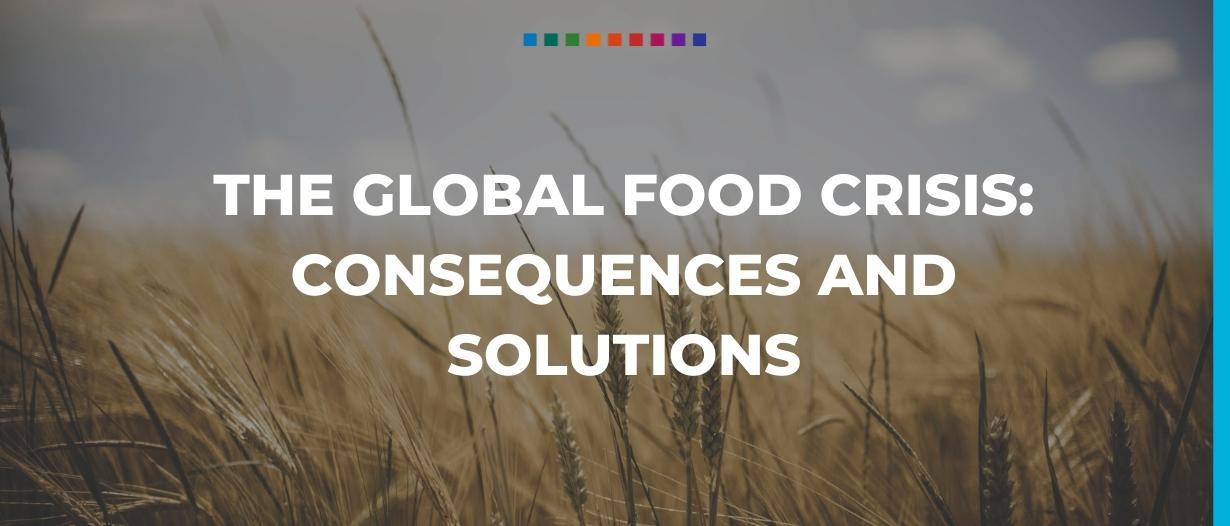Estimated reading time: 5 minutes
Today, the world is witnessing a severe global food crisis triggered by heavy inflation, supply chain disruption, and the Russia-Ukraine conflict.
This comes when the global food market stability is still recuperating from the COVID-19 pandemic-induced economic crisis and climate-linked crop failures, both hurricane and drought-led.
Consequently, low-income economies that hinge on food imports heavily have been hit the hardest.
Major call-to-actions to combat the situation
The current agro-situation is about food availability and essential food items access––including wheat, rice, maise, and seed oil––to the neediest and the most vulnerable economies.
Experts assert that open trade, information transparency, waiver in food import bills, and, most importantly, free flow of fertilisers for farmers worldwide are the prominent calls to action to alleviate the situation.
Assisting farmers with weather index subsidies, and helping them sow weather-resistant seeds to control crop losses, are some of the measures that require universal infrastructure.
The macro-level consequences
Alongside developing nations, the Global North, including the UK and US, is also experiencing a rise in food prices.
However, developing African nations are significantly impacted because of their insecurity of either getting inadequate or unaffordable essential food items.
If we consider North Africa, its countries rely on Russia and Ukraine for wheat imports, and their governments’ rising food bills are impossible to pay.
The region now desperately seeks UN intervention to bring food and inflation relief measures.
Government responses to the food crisis
Rather than finding a corroborative approach to the situation, the primary food exporting governments have imposed individual trade restrictions on their food grain trade, exacerbating the situation.
This counts for 20 nations that levied heavy taxes on their agro-exports by mid-2022 and their combined 17% restrictions in trade calories.
In May this year, India restricted its wheat export to support domestic access to the grain; in September, the nation banned broken rice export and put a 20% duty on non-Basmati rice, excluding parboiled rice.
However, the broken rice export ban decision was taken to boost the nation’s ethanol-blending program and lessen its dependence on unaffordable oil imports.
Grain usage for ethanol production has been permitted in the nation.
Additionally, the Russia-Ukraine conflict has aggravated the black market and grain hoarding, hurting dwindling economies like Tunisia and Turkey.
As part of pre-emptive measures against the arbitrary export of food grains, the Tanzanian government has made company registration for Kenyan importers compulsory in Dar es Salaam.
Increase in hunger and global malnutrition
Longstanding inflation, extreme climatic conditions, famine in certain nations aggravated by the pandemic, and armed European conflict have led to one of the century’s most deep-rooted global food insecurity.
Even before the Russian invasion of Ukraine, there were inflationary tensions in the commodity market, but the situation became all the more severe as the conflict set in.
Eventually, Russia’s shortage of fuel and fertiliser supplies, like nitrogen and potash, affected farmers worldwide. It caused a shrink in harvests of wheat, corn, rice, and oil seeds, and eventually, the whole supply chain now seems dismantled.
Economists predict that a grave situation prevails today. If it persists for a few more years, it could reverse the mass hunger and malnutrition reduction efforts made by international bodies in the past.
Effects of the conflict
The Russia-Ukraine conflict has put nearly 30% of the wheat supply they jointly provide to the world on hold. The conflict has also affected the supply chain of barley, sunflower seed oil, and corn for the same reason.
In the past seven years, there have been continuous social upheavals and political conflicts in conflict-ridden nations, most of which are struggling developing economies. One may refer to Ethiopia, Afghanistan, Central Africa, Gambia, Liberia, Mali, Mozambique, Rwanda, Somalia, South Sudan, Syria, Yemen, and Ukraine.
The conflict-hit zones are expected to have suffered food insecurity the most, as the political establishment cannot cope with the rising import bills and social instability all at once.
Global economic sanctions have always been debatable, and socio-political tensions have made vulnerable nations pay the price for the instability that these tensions bring to the world.
Rice shortages
Global food insecurity in 2022 is more of a food access problem, which can be managed with a collateral approach. The reactions are quite the opposite, as, after the wheat grain, it’s now the rice availability issue.
Fertiliser cost is skyrocketing, severely hitting rice production, wherein the monsoon has already reduced rice production in the nations like India. Most countries, including the majority of Asia and Sub-Saharan Africa, depend on rice as their staple food.
Economists and international bodies are pledging adequate fertiliser supplies to the rice-producing nations so that other importing countries are not deprived of their staple food in the coming years.
How international bodies are addressing the nations
The global food crisis of 2022 has garnered much concern. International bodies, including the United Nations World Food Programme (UNWFP), and International Monetary Fund (IMF), have deliberated on how to control the current food insecurity crisis.
World nations and crisis experts also expect the IMF to step in and waive or defer the balance of payments.
This could control the social unrest prevailing in the conflicting nations with no future security and struggling to feed their people. The most prominent example is the climate-induced food insecurity in Pakistan and the nation’s rising balance of payments.
As per UNWFP statistics, the number of people facing food insecurity has doubled to 276 million in the past two years, with around 811 million of the population sleeping on an empty stomach.
This figure could reach up to 1.7 billion, with an increase in food import bills by over $25 billion for the vulnerable economies, predicted the UNWFP.
























